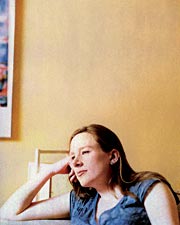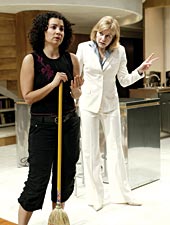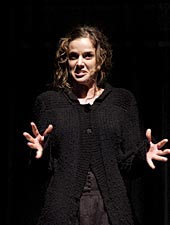 |
Though The Clean House, a prizewinning play by the Wilmette-born playwright Sarah Ruhl, enjoys a run in May at the Goodman Theatre, that won’t be the first time the work has had a showing in the Chicago area. In 2003, the legendary Piven Theatre Workshop in Evanston gave The Clean House its first full-length reading. Today, Ruhl describes that occasion as a sort of family affair: the cast included Ruhl’s mother and Mary Ann Thebus, both local actresses, and Joyce Piven, cofounder of the workshop and Ruhl’s mentor and collaborator. Jessica Thebus, Mary Ann’s daughter, directed. “Talk about an Oedipal reading,” Ruhl says, smiling.
Obviously, the play survived the powerful crosscurrents. In 2004, The Clean House won the prestigious Susan Smith Blackburn Award-the most important American prize designated for a woman playwright-and was a Pulitzer finalist after opening at the Yale Repertory Theatre and elsewhere across the country. This year, it is being produced in at least six theatres. “Plus ones in Australia, England, and Canada,” Ruhl says.
It’s late winter and Ruhl is sitting for an interview at New Dramatists Studio on West 44th Street in Manhattan. Even seven months pregnant, Ruhl-elfin, blond, 31 years old-suggests a combustible mix of Funny Girl and stalwart Willa Cather heroine. She excels in the role of the former, although she confesses that she has been surprised by the degree to which audiences find The Clean House funny. But what she ultimately sees in jokes is their deep seriousness-so Willa Cather is closer to her own character’s core.
Joyce Piven paints Ruhl as a model of Midwestern stoicism. She doesn’t agonize over her writing, says Piven, contrasting her friend with other (presumably non-Chicago) writers. She just “gets down to it.”
When Ruhl talks about her own life and work, it all takes on aspects of Chekhovian melancholy and mischief more than denial. She fixes her green eyes on you and tells her family history in a squeaky voice, transforming any sadness into funny business. Besides her father, a marketing executive (who died when she was 20, she says without pausing), and her mother, an amateur actress (“She worked with Mamet’s early material”), everyone in Ruhl’s family is a doctor. She rushes to the punch line: she married a psychiatrist whom she met in graduate school.
And then to another: “If anyone ever gets sick in our family, he’s in good hands.”
|
Photograph: Henry Di Rocco/
Courtesy of Goodman Theatre  |
|
Mary Beth Fisher (right) stars as Lane in the Goodman production of The Clean House. Pictured with Adriana Sevan, as Matilde, in South Coast Repertory’s 2005 production |
The Clean House actually began as an anecdote overheard at a doctors’ cocktail party in Los Angeles. “Two doctors were talking about their cleaning women,” Ruhl says, sounding as though she were about to launch into a well-polished shtick: “One said, ‘My cleaning lady is depressed and won’t clean my house. So I took her to the hospital and had her medicated. And she still won’t clean!'”
Ruhl smiles and turns professorial. “To me this said a lot about gender and class.”
That’s The Clean House. “There is no play currently on the American stage more ambitious in its mix of humor and gravitas, in its combining of lyricism and big ideas,” says Mark Bly, the senior dramaturg at Washington, D.C.’s Arena Stage, which produced Ruhl’s epic Passion Play in 2005. “The Clean House begins as a Douglas Sirk romantic comedy”-think Has Anybody Seen My Gal?-“but leaps into abstract Albeeish territory.”
Set in “metaphysical Connecticut,” as the script puts it, the play tells the story of a Brazilian maid named Matilde and that of her boss, Lane, a doctor who fell in love with her future husband, Charles, also a doctor, “over a dead body in medical school.” While Matilde tries to tell jokes, Lane’s sister, Virginia, becomes obsessed with cleaning. Charles falls in love with an older woman, Ana, on whom he’s just performed a mastectomy.
The ending, says Bly, “is a testament to the messiness of life.”
More than her play’s messiness, Ruhl loves to talk about transformation-her own and the kind that takes place in her plays. Growing up, she saw herself more as a writer than as a playwright, although she went to her mother’s rehearsals and “a lot of theatre at the Goodman.” She remembers A Christmas Carol and Mary Zimmerman. She also took theatre classes at Piven. “She began as an actress,” says Joyce Piven, recalling her former student, “but she was not suited for that role.”
After graduating from New Trier High School, Ruhl attended Brown University, where she studied English literature. While a senior, she asked Paula Vogel, a professor and the author of the 1998 Pulitzer-winning play How I Learned to Drive, to advise her thesis, which was about representations of actors in 19th-century literature.
As Ruhl recalls, Vogel declined, but said, “If you write a play, I’ll advise that.” Ruhl took those words as a challenge and wrote what would eventually become Passion Play-a trilogy of dramas about religion and society.
After college, Ruhl came back to Chicago and worked, which, she says, resulted in “like, a hundred W-4 forms.” She went to writers’ colonies, including Ragdale in Lake Forest. While in Chicago, she decided to pursue playwriting more seriously.
In 1998, Ruhl got accepted into Columbia University’s Oscar Hammerstein II
Center for Theater Studies in playwriting, but dropped out after a week. “I didn’t want to spend $50,000 a year going to school,” she says. Instead, the following year, she entered the Brown MFA playwriting program, which she paid for entirely by grants and assistantships. There, she studied with Vogel, whom she describes as “the Yoda of American theatre.” Ruhl adds, “I wouldn’t be writing if not for her.”
At a time when the American theatre is head over heels in love with one-person plays that look like television shows, Ruhl takes an ambitious approach to her writing. Asked about her big themes, she gets serious: “Death. Altered states. Doomed love. Some kind of magic.” She explains that she is “attracted to the old stories.” Indeed, three of her earlier plays are adaptations: Orlando, a 1998 riff on the Virginia Woolf novel; a 2000 theatrical rendition of Chekhov short stories; and Eurydice, a 2004 contemporary reworking of the Orpheus myth.
|
Photograph: Wolly Mammoth/Stan Barouh
Courtesy of Goodman Theatre  |
|
Guenia Lemos plays Matilde, the maid who won’t clean, in the Goodman’s upcoming production of The Clean House. |
The Clean House is Ruhl’s first play to receive rave reviews. Chris Jones damned Eurydice with faint praise in his 2004 Chicago Tribune review. After the Washington and New York productions of Passion Play, Charles Isherwood wrote in The New York Times, “Passion Play is largely incoherent, a long fizzle that, despite incendiary subject matter and flashes of oddball humor, never catches fire.”
Critics aside, everyone from Ruhl’s high-school French teacher to her most recent collaborators adores her. “Sarah Ruhl is simply the best emerging writer of her generation,” says Paula Vogel. “Each time I read one of her plays, I see the world with new, fresh eyes.” Andre Pluess, a Chicago-based sound designer who has worked on two productions of The Clean House, says Ruhl is one of the only people writing who go “beyond theatrical cliché.” Jessica Thebus, who is directing the Goodman Theatre production of The Clean House, says: “She makes you excited about the theatre as being a strange and magical thing.” Robert Falls, the artistic director of the Goodman, says, “She’s a fantastic artist and she’s commercial. That’s rare.”
As befits a playwright with those two talents, Ruhl is busy. A month after the interview at New Dramatists, she’s about to give birth, she’s in the process of moving from Los Angeles to New York, and she’s working on at least one commission in each city. (The New York project is called Dead Man’s Cell Phone and revolves around what happens when a man’s cell phone keeps ringing post mortem.) In that tumult, asked whether she considers herself a Chicago writer, Ruhl pauses to cast about for a joke. Then she thinks better of it. “Of course,” she says, suddenly serious. All roads lead to Chicago. Her roots are here.
Photograph by Drew Reynolds


